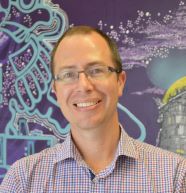Thursday 16 February 2023 3:00pm

EDOR researcher Professor Ben Wheeler, was recently featured on TVNZ's 1News highlighting the exciting findings from a recent trial for youth (aged 13 -25 years) with type 1 diabetes.
This research trial is one of the first studies to use artificial pancreas technology (a form of automated insulin delivery) in youth who are struggling to control their glucose levels. Large improvements in glucose control were observed when these young people used this technology, compared to traditional diabetes treatment.
Professor Wheeler said that these results are particularly interesting, as youth with poorly managed type 1 diabetes are usually excluded from using these technologies to manage their condition:
"No one's tried to use this sort of equipment on these people before, because they're essentially people who've been failing our traditional therapies", says Professor Wheeler.
The findings from this study could have an important impact on access to diabetes technologies, as many youth who are struggling to control their diabetes are not usually given the opportunity to use these life-changing treatments.
Traditional treatment vs Artificial Pancreas technology
Type 1 diabetes is an auto-immune disease that requires constant monitoring of blood glucose levels, and regular doses of insulin to keep the blood glucose concentrations within the healthy range.
Traditional treatment for type 1 diabetes involves pricking fingers multiple times per day, injecting insulin manually, monitoring what you eat and how much you exercise you have, to make sure your blood glucose doesn't go too high or too low. The artificial pancreas uses a continuous glucose monitor (CGM) with an algorithm that monitors your glucose levels and administers insulin through an automatic insulin pump in response to the glucose readings.
The research showed that when the participants were using the artificial pancreas technology, they were in a "healthy" blood glucose range for an average of 67% of the time, compared to only 20% of the time when using the traditional therapies.
Professor Wheeler and his team are now extending this trial to include younger children, from age 7. The researchers are currently recruiting participants around Aotearoa New Zealand.
Click here to learn more about the Co-Pilot trial, which is partially funded through a generous donation from Lions New Zealand District 202F.
A lack of access to life-changing diabetes treatment
There continues to be strong research evidence that technology using continuous glucose monitors (CGM) is the most effective way to manage type 1 diabetes for many people. Yet, unlike in the UK and Australia, CGM devices are not funded in New Zealand.
The lack of funding for CGM has meant that only those who can afford to pay around $4000-$5000 per year have access to these devices.
1News reported that Pharmachas two CGM devices on their "wish list", but they are unable to fund them until they receive more money from the government. In the meantime, thousands of people, including children and youth, are unable to access these life-changing, and sometimes life-saving, treatments.
Watch the 1News story here
- World-first trial helping type 1 diabetes described as huge success, 1News, 8 February 2023
EDOR's advocacy for access to diabetes technology
- Transforming Lives: 100 years of insulin, Wellington, 24 November 2022
- 100 years after insulin was first used, why isn't NZ funding the latest life-changing diabetes technology? The Conversation, 16 November 2022
Learn more about EDOR's type 1 diabetes research
- Closed loop therapy study for youth with type 1 diabetes
- The Co-Pilot Trial - closed loop for youth aged 7-25 years with type 1 diabetes
- Other EDOR diabetes research
Contact Professor Ben Wheeler
ben.wheeler@otago.ac.nz
